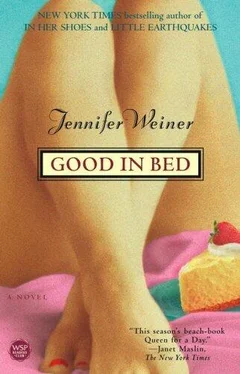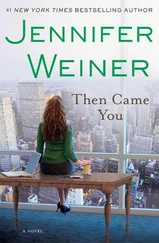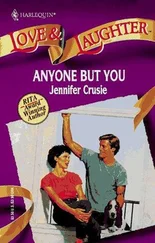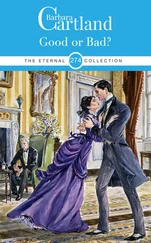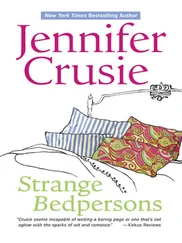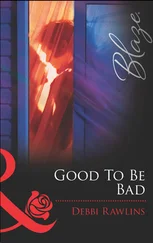And even strangers said she was a miraculously beautiful baby, with peachy skin, wide eyes, sturdy limbs pillowed with cushiony rolls of fat, and a wonderfully happy way about her. I’d named her perfectly. Unless she was hungry, or her diaper was wet, Joy was always smiling, always laughing, observing the world closely through her wide, watchful eyes. She was the happiest baby I knew.
My mother handed her over, then impulsively reached and hugged us both. “I am so proud of you,” she said.
I hugged her hard. “Thank you,” I whispered, wishing that I could tell her what I really wanted to, that I could thank her for loving me when I was a girl, and for letting me go now that I was a woman. “Thank you,” I said again. My mother gave me a final squeeze, and kissed Joy on top of her head.
I filled Joy’s white tub with warm water and gave her a bath. She cooed and clucked as I poured the water over her, washing her legs, her feet, her fingers, her sweet little baby behind. I rubbed on lotion, dusted her with powder, snapped her into a white knitted dress and put a white hat with roses embroidered around the edges on her head. “Baby,” I whispered in her ear, “baby Joy.” Joy waved her fists in the air like the world’s tiniest triumphant athlete and gurgled a liquid string of syllables, like she was having a conversation in a language none of us had learned.
“Can you say mama?” I asked.
“Ahh!” Joy announced.
“Not even close,” I said.
“Oo,” she said, looking at me with her big, clear eyes, as if she understood every word.
Then I handed her off to Lucy and went to take my own shower, to do my hair and face, to practice the speech I’d been writing for days.
I could hear the doorbell chiming, the door opening and closing, people coming inside. The caterers had come first, and Peter had come second, with two boxes wrapped in silver paper and a bouquet of roses. “For you,” he’d said, and put the flowers in a vase. Then he took Nifkin for a walk and emptied the dishwasher while I finished getting things in order.
“What a sweetheart,” said one of the caterer’s assistants. “I don’t think my husband even knows where the dishwasher is.” I smiled my thanks without bothering to correct her. It was all too confusing to explain to strangers… like telling them I’d gone through the day with all my clothes on backward. First comes love, then comes marriage, then comes baby in a baby carriage. Even little kids knew how it was supposed to go. But what could I do? I reasoned. What happened happened. I couldn’t undo my history. And if it had given me Joy, there was no way I would want to.
I walked into the living room with Joy in my arms. Maxi was there, and she smiled at me, giving me the tiniest of waves. Samantha was next to her, and next to Sam were my mother and Tanya, Lucy and Josh, Betsy and Andy and Andy’s wife, Ellen, and two of the nurses from the hospital who’d taken care of Joy. And, in one corner, was Audrey, impeccably turned out in crisp cream-colored linen. Peter was standing beside her. All my friends. I bit my lip and looked down to keep from crying. The rabbi asked for silence, then asked for four people to come forward to hold the posts of the huppah. It was my grandmother’s, I saw, recognizing the fine old lace from my cousins’ weddings. It was the huppah I would have been married under, had I gotten things in the right order. At naming ceremonies the huppah is meant to shelter the baby and the husband and wife. But I’d made prior arrangements, and at the rabbi’s request everyone crowded under the huppah with me. My baby would get her name surrounded by all of the people who’d loved and sustained us, I decided, and the rabbi had said that it sounded fine to her.
Joy was awake and alert, taking it all in, beaming as if she knew she was the center of attention, as if there was no doubt that it was exactly where she was meant to be. Nifkin sat politely by my feet.
“Shall we begin?” asked the rabbi. She gave a short speech about Israel and Jewish tradition, and how Joy was being welcomed into the religion handed down from Abraham, Isaac, and Jacob, and also Sarah, Rebecca, and Leah. She chanted a blessing, said prayers over bread and wine, daubed a cloth in Manischevitz and pressed it against Joy’s lips. “Ooh!” Joy chortled, and everybody laughed. “And now,” said the rabbi, “Joy’s mother, Candace, will tell how she chose the name.”
I took a deep breath. Joy looked at me with her wide eyes. Nifkin was very still against my leg. I pulled a notecard out of my pocket.
“I’ve learned a lot this year,” I began. I took a deep quavering breath. Don’t cry, I told myself. “I learned that things don’t always turn out the way you planned, or the way you think they should. And I’ve learned that there are things that go wrong that don’t always get fixed or get put back together the way they were before. I’ve learned that some broken things stay broken, and I’ve learned that you can get through bad times and keep looking for better ones, as long as you have people who love you.” I stopped and swiped my hand across my eyes. “I named my baby Joy because she is my joy,” I said, “and she’s named Leah after her father’s father. His middle name was Leonard, and he was a wonderful man. He loved his wife, and his son, and I know that he would have loved Joy, too.”
And that was all. I was crying, Audrey was crying, my mother and Tanya were holding each other, and even Lucy, who tended to go non-reactive at sad occasions (“It’s the Prozac,” she’d explain), was wiping away tears. The rabbi observed this all, a bemused look on her face. “Well,” she finally said, “shall we eat?”
After the bagels and whitefish salad, after butter cookies and apple cake and mimosas, after Nifkin had devoured a quarter pound of Nova lox and been sick behind the toilet, after we’d opened the gifts and I’d spent fifteen minutes telling Maxi that Joy, wonderful baby that she was, was really not going to be needing a strand of cultured pearls until at least her eighteenth birthday, after we’d cleared away the wrapping paper and put away the leftovers and the baby and I had taken a nap, Peter and Joy and I walked down to the river to wait for the century’s end.
I was feeling good about things, I thought, as I bundled Joy into her stroller. Preproduction on my movie was beginning. My version of “Loving a Larger Woman” had come out at the end of November, replacing Bruce’s column. The response, the managing editor told me, had been overwhelming, with every woman who’d ever felt too big, too little, too ugly or strange to fit in or be worthy of love writing in to praise my courage, to decry B’s selfishness, to share their own stories about being big and female in America, and to offer best wishes to baby Joy.
“I’ve never seen anything like this,” the managing editor had said, describing the piles of mail, baby blankets, baby books, teddy bears, and assorted religious and secular good-luck icons that had filled the Moxie mailroom. “Would you consider writing for us regularly?” She had it all figured out – I’d do monthly dispatches from the single-mom front, ongoing updates on my life and Joy’s. “I want you to tell us what it’s like to live your life, in your body – to work, to date, to balance your single friends with your obligations as a mother,” she said.
“What about Bruce?” I asked. I was thrilled with the chance to write for Moxie (and even more thrilled once they’d told me what it paid), but I was less than enamoured with the thought of seeing my articles appear next to Bruce’s every month, watching him tell readers about his sex life while I filled them in on spit-up and poopy diapers and how I could never find a bathing suit that fit.
Читать дальше
